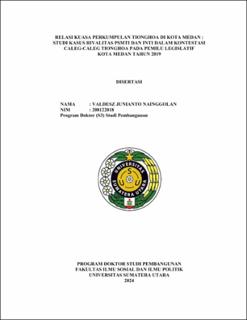| dc.description.abstract | The uniqueness of role (the Chinese social, cultural, economic, and political role in Indonesia) is reflected in the Indonesian long history, especially political role which is connected with four stages of the Indonesian struggle: the stage of pre- nationalism (1900-1907), the stage of proto-nationalism (1908-1926), the stage of Indonesian nationalism (1927-1942) (Suryadinata, 1978), and post-reformation (1998-now) which causes rivalry of two Chinese communities: PSTMI (Indonesian Chinese Clan Social Association) which struggles for their integration according to their original culture (multiculturalism) in Indonesia, and INTI (Chinese Indonesian Association) which struggles for the acceptance of the Chinese through assimilation in Indonesia. Both of them compete with each other to place their Caleg (candidate legislative members) in various political parties in order that they can fight for their interest in the political affairs. The phenomenon of political rivalry and cultural hegemony toward the members of these two social organizations is interested to be studied because their use of democracy for their power. These two Chinese organizations play an important role in appointing their candidates in parliament and political parties by popularizing them internally through cultural and political campaign so that their candidates will be in parliament. During the reformation era to the process of democratization, the Chinese mass organizations used cultural hegemony for their candidates' interest. This research uses qualitative method with case-study design which is aimed to analyze the uniqueness of the rivalry process and cultural process in struggling for their ideology in the social and political discourse and reality of the Chinese community in Medan. The activity of profound discourse and observation are done in the Pileg (Legislative election) in 2019, and the data are collected by collecting documents or files or literature; besides that, data condensation and data display are done, followed by conclusion drawing (Miles and Huberman, 2019). The result shows that authoritative relation and rivalry run harmoniously. However, in determining the Candidate legislative members and the attempt to win the election, cultural hegemony occurs, and even there is clientele cultural hegemony model which is strengthened with symbolical harshness such as coercion to win their candidates in these two associations. | en_US |


